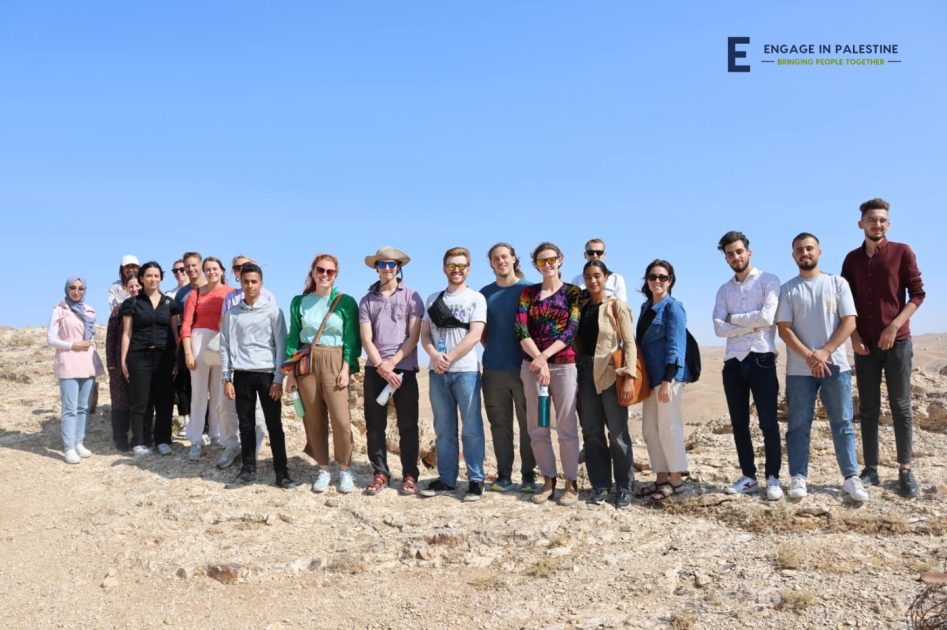Traveling around Palestine and Israel: Misconceptions About Traveling to the West Bank: If you listen to Western media, you will often hear about the dangers of traveling to the West Bank. However, we recommend that you do not believe everything you hear or read; there are several misunderstandings and erroneous preconceptions concerning the safety of foreign visitors to the West Bank.
Table of Contents
Palestinians Welcome International Visitors
Contrary to what you may see on television or read in the newspaper, Palestinians are really nice and pleasant people. There is no need to be scared to travel throughout Palestine and Israel by yourself, as opposed to with a group of foreign volunteers. People in Palestine are always happy – and often eager – to assist guests from other nations in getting where they need to go.
Most Palestinians are glad to see international visitors because it means that people from other countries are coming to the West Bank to find out about it for themselves. Overseas visitors are then able to raise awareness about Palestine when they return to their home country.
Volunteers, inters and students at Engage in Palestine have often stated how at ease they feel when going across the West Bank.
Safety While Traveling In Palestine And Israel
When traveling to the West Bank from Israel, most visitors’ major worry is safety. The official signs you’ll see when entering cities like Hebron or Bethlehem, which effectively advise Israelis to keep out of Palestinian regions since it’s unlawful and allegedly hazardous under Israeli law, do not help things. Keep in mind, however, that these signs are not aimed at, and have little influence on you as an overseas tourist.
Areas A, B and C
The signs are put up by Israelis to keep their nationals out of Palestine’s autonomous zones. The Oslo II Accord between Israel and the Palestinian Authority separated the West Bank into three (non-continuous) sectors: Area A under Palestinian authority, Area B under Israeli-Palestinian joint management, and Area C under Israeli control. Under the agreement, Israeli people are not permitted to enter Area A, while the Israeli military and authorities caution civilians against entering Area B.
How This Affects International Tourists
Nonetheless, the Oslo Accords have no influence on you as an international guest. This leads us to our second point: as a guest, you are not a party to the fight. Most people in the neighbourhood understand this, so no matter how hot things become between the Palestinians and the Israelis, don’t aim your rage towards them.
A Suggestion
One overall safety suggestion is to avoid taking sides in the dispute accidentally. Announcing your desire to visit, say, Hebron in your Tel Aviv hostel is risky, as is wearing any piece of clothing, t-shirt, cap, jewellery, etc. that identifies you with Israel or Judaism when in Palestine.
Most Israelis do not care if you want to visit Palestine, and most Palestinians do not care whether you’re Jewish; this is mostly to prevent conflict with the 0.01 percent of individuals in any culture who are unstable or fanatics.
Checkpoints In Israel
Israel has checkpoints that divide Palestine from Israel. There is an Israeli checkpoint at the entrance to each city. As an international, you are free to pass through these checks whenever you wish (with your passport and visa), as they are aimed to Palestinians.
Getting Around Palestine
Affordability
It is fairly cheap to travel around Palestine. Traveling as a group and choosing a shared taxi or bus service is definitely the most convenient and cost-effective option. Taking a day excursion to Bethlehem traveling there and back in a shared taxi, for example, will cost roughly 20 shekels per person.
Traveling inside Hebron and purchasing meals and gifts is also reasonably priced. When visiting landmarks such as the Old City and the Ibrahimi Mosque, be sure to ask a local for an estimate of the pricing.
Transportation System
Due to the small size of Palestine and the restrictions placed by the Israeli occupation on freedom of movement within the Palestinian Territories, taxis are the more reliable mode of public transport to travel in Palestine. There are no public railways, metros, trams or public buses in the West Bank and Gaza as there are in Israel.
However it is surprisingly simple to move around the West Bank. One important factor is because distances in the area are quite small. For example, it takes around one hour to go from Jerusalem to Hebron in the southern West Bank. There are several private transportation choices available, as well as frequent public transit.
What Mode Of Transportation Do Palestinians Use?
Taxis are a popular method of transport throughout the West Bank and are the most efficient way if you do not have a car.
Travel Within A City
Palestinian taxis are divided into three main types: Firstly, as in most countries, private taxis travel both between and within cities, and to and from the particular locations of the passenger’s choice. Second, are shared (yellow ‘service’ minivan taxis) which travel within cities and which will generally travel to and from a particular location of your choice.
Both of these types of taxis can be hailed in the usual manner, by waving your arm at the side of the road and informing the driver who stops of the place you want to go.
Travel Between Different Cities
Thirdly, there are also shared (yellow ‘service’) taxis which travel between cities. These shared taxis arrive in and depart from main taxi stations only. Like shared taxis which travel only within cities, intercity taxis have no set schedule. This type of taxi tends to depart only when the taxi is full.
Using a service is the most usual method to get from one city to another. The servees are cabs that are shared by many people. There’s no need to reserve them ahead of time since they only depart when they’re filled. You may either take one at the Hebron bus station or hail one on the street. Inter-city travel is quite inexpensive by European standards, with a journey from Hebron to Bethlehem costing roughly 9 shekels.
Download Maps On Your Phone
Maps may be downloaded on your phone from websites such as maps.me. When you arrive, you are unlikely to have internet connection unless you are fortunate enough to discover free Wi-Fi hotspots or have pre-purchased an international sim or a digital e-sim.
If you bring your SIM card from home, you may be able to connect to the internet, but only at exorbitant international roaming charges and with limited service at best. If you study and download maps, you’ll be ready to utilize the app while you’re not connected to the internet in the West Bank.
Culture In Palestine
The culture of Palestine may seem alien at first, yet living here reveals characteristics of humanity that transcend cultural differences. Regardless of how unlike two people seem to be, you have much more similarities than differences. Traveling to Palestine also makes you more aware of the media you consume.
Much Of Palestinian Life Is Ordinary Moments
Those in Palestine, like people everywhere else, like joking around, relaxing, and spending time with their family. We frequently forget this when we are bombarded with pictures of war and anxiety on the news. When you’re here, you will discover that much of Palestinian life consists of these ordinary human moments.
We are all human and despite our circumstances, race, religion etc. we all have the same fundamental human needs and we all have lots of things in common. You may also be surprised to find that some of the differences between cultures are not as vast as you imagined. It is good to learn about different perspectives and viewpoints.
Sometimes the only way to really understand something is to see it personally, ask questions, and listen to other people’s tales. A journey to Palestine provides that priceless chance.
Travel Around
- Travel from Hebron to Jerusalem
There are several shared taxis that go from Hebron to Jerusalem. It takes around an hour to drive the 30 kilometers to Hebron. Many foreign visitors spend the weekend in Tel Aviv, Haifa, Jerusalem, Akko, and Yafo, among other places. You may simply travel as an international. You just need to bring your passport and visa.
- From Bethlehem to Hebron
Bethlehem is just approximately 20 kilometers from Hebron and takes about 40 minutes to get there. Many foreign visitors come to Bethlehem to see the Church of the Nativity and to spend time in the Old City.
- Travel from Hebron to Ramallah.
A shared cab ride from Hebron to Ramallah takes roughly an hour and a half. Taxis operate from early morning till roughly nine o’clock at night.
- Travel from Hebron to Dead Sea
The Dead Sea is just a half-hour drive from Hebron. You may take a shared cab to Jericho and then another taxi to the Dead Sea, which takes around 10 to 15 minutes from Jericho.
- From Hebron to northern West Bank
It is also feasible to get to the northern West Bank from Hebron. If you want to visit Nablus, Jenin, Tulkarm, Qalqilya, etc., you must first go to Ramallah and then from the Ramallah bus station to anywhere you want to go, which usually takes two to four hours.
To Summarize
Traveling throughout Palestine and Israel is quite safe and is inexpensive in Palestine, while much more expensive in Israel. Palestine is a tiny nation and traveling from one city to another does not take long. Furthermore, it is fascinating to discover how each city in Palestine differs from one another in terms of culture, variety, climate, and landscape.
We strongly advise our foreign volunteers and interns, as well as our students, to go across Palestine and Israel to explore and understand the region, as well as to witness the contrasts between the two.
Questions?
Should you have any questions, please do not hesitate to contact at Info@ecpalestine.org
Whatsapp:+972599479880
For more information, please visit our website: https://excellencenter.org/
Excellence Center’s Facebook page: https://www.facebook.com/ExcellenceCenter
Excellence Center’s Facebook account: https://www.facebook.com/RafatECHebron
Watch us on Youtube: https://www.youtube.com/channel/UCsQSLdFZWZcBm6Uj0XMYuKg
Visit and Explore Palestine: https://www.facebook.com/ExplorePalestine

























